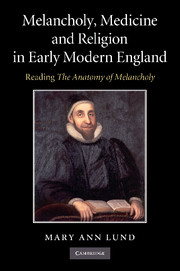Book contents
- Frontmatter
- Contents
- Acknowledgements
- Abbreviations
- A Note on Citation
- Introduction: Zisca's Drum: Reading and Cure
- Chapter 1 Imagining Readings
- Chapter 2 The Cure of Despair: Reading the End of The Anatomy of Melancholy
- Chapter 3 Printed Therapeutics: The Anatomy of Melancholy and Early Modern Medical Writing
- Chapter 4 The Whole Physician
- Chapter 5 Speaking out of Experience
- Chapter 6 The Structure of Melancholy: From Cause to Cure
- Conclusion
- Bibliography
- Index
Conclusion
Published online by Cambridge University Press: 23 February 2010
- Frontmatter
- Contents
- Acknowledgements
- Abbreviations
- A Note on Citation
- Introduction: Zisca's Drum: Reading and Cure
- Chapter 1 Imagining Readings
- Chapter 2 The Cure of Despair: Reading the End of The Anatomy of Melancholy
- Chapter 3 Printed Therapeutics: The Anatomy of Melancholy and Early Modern Medical Writing
- Chapter 4 The Whole Physician
- Chapter 5 Speaking out of Experience
- Chapter 6 The Structure of Melancholy: From Cause to Cure
- Conclusion
- Bibliography
- Index
Summary
It is with a sense of deliberate provisionality that Burton ends his book. Over six editions, the text swelled to nearly one and a half times its original size, and one suspects that only the writer's death prevented further expansion. In this respect the Anatomy resembles the growth of Montaigne's Essais, but the comparison ends there. For while Montaigne's emendations reflect the inconstancy of a continually changing personality, Burton's represent the constantly varying nature of melancholy and of his unknown readership. Provisionality applies not only to the development of the book, but also to the nature of the cure the book offers. This notion is pointed to by the final Latin tag of the work, taken from Augustine via Hemmingius, which exhorts the reader to repent while of sound mind: ‘Age pænitentiam dum sanus es.’ He or she can then be free from doubts, ‘quod pænitentiam egisti eo tempore quo peccare potuisti ’ [because you were penitent at a time when you might have been guilty of sin] (III, 446). Just as melancholy can be staved off by avoiding being solitary or idle, so the very action of repentance guards against sin. The parallel between melancholy and sin is drawn until the very end of the work. Burton's final emphasis is on performance, not in the Catholic sense of doing penance to expiate for one's sins, but rather as a means of enabling cure. Reading The Anatomy of Melancholy is a type of performance which fulfils Burton's own advice of keeping occupied.
- Type
- Chapter
- Information
- Melancholy, Medicine and Religion in Early Modern EnglandReading 'The Anatomy of Melancholy', pp. 196 - 203Publisher: Cambridge University PressPrint publication year: 2010



